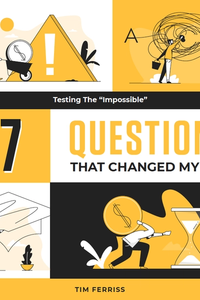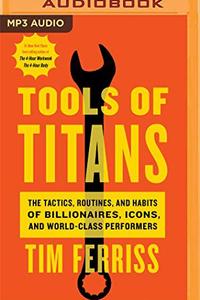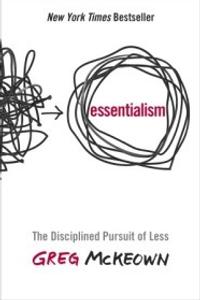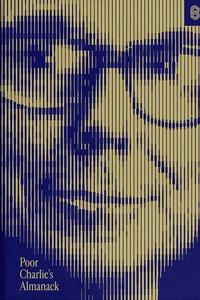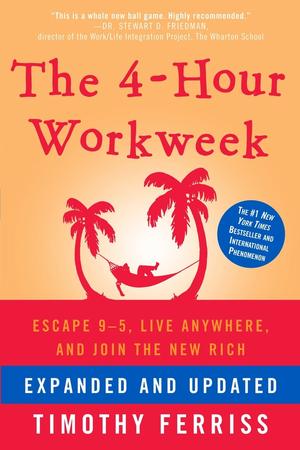
The 4-Hour Workweek by Tim Ferriss: Summary & Notes
by Tim Ferriss
In One Sentence
Escape the "deferred life plan" by designing a lifestyle that frees you from the 9-5 through automation, outsourcing, and the 80/20 principle—retire now, not at 65.
Key Takeaways
- DEAL: Definition, Elimination, Automation, Liberation
- The 80/20 rule: 80% of results come from 20% of effort
- Eliminate before you delegate or automate
- Create a "muse"—an automated income business
- Mini-retirements beat deferred retirement
- Fear-setting: define worst-case scenarios to overcome paralysis
Summary
The 4-Hour Workweek is the book I credit with getting me into entrepreneurship in the first place. The ideas of passive income, living a flexible lifestyle, and eliminating the non-essential has been a consistent theme in my life.
Perhaps even more remarkable, the content of the book is more relevant now than ever before, with more and more tools available for making the aims of the book a reality.
This one has been a bestseller since publishing for a reason. Everyone can learn something from this book.
Who Should Read This Book
- People trapped in soul-crushing jobs
- Aspiring location-independent entrepreneurs
- Anyone who wants to question the work-retire-die life script
- Those interested in lifestyle design
FAQ
What is the 4-Hour Workweek about?
It's about escaping the traditional work model through automation, outsourcing, and the 80/20 principle. Ferriss proposes mini-retirements throughout life rather than working until 65. The goal is freedom and experiences, not maximum income.
📖 Chapter-by-Chapter Breakdown
Click to expand the full detailed notes for every chapter →
📖 Chapter-by-Chapter Breakdown
Click to expand the full detailed notes for every chapter →
Notes
- People don’t want to be millionaires; they want to experience what they think millionaires can buy.
- The real question is: how can one achieve the lifestyle of complete freedom without first having $1M?
- If you can free your time and location, your money is automatically worth 3-10x as much (if your money is USD). This is geo-arbitrage.
- Money multiplies in value depending on the number of W’s you control in your life: what you do, when you do it, where you do it, and with whom you do it.
- Capacity, interest, and mental endurance all wax and wane; alternating periods of activity and rest is necessary to survive, let alone thrive.
- Focus on being productive instead of busy.
- For all the most important things, the timing always sucks.
- It is far more lucrative and fun to leverage your strengths instead of attempting to fix all your weaknesses.
- In excess, most endeavors and possessions take on the characteristics of their opposite.
- Fear setting: define the absolute worst that could happen if you did whatever you’re considering. What doubt, fears, and “what-ifs” pop up as you consider the big changes you can or need to make?
- Then, think about what you could do to repair the damage, or get things back on the upswing, even if temporarily?
- Most people aim for the mediocre, but this is where there’s the most competition. Having a big goal means you’ll have less competition, and is also more motivating.
- The opposite of love is indifference, and the opposite of happiness is boredom. To be happy, you should be seeking excitement.
- Dreamlining: make a list of all the things you dream of doing, pick the top 4, and then determine the cost of these things and translate it into a target monthly income: what you would have to pay per month to cover these things.
- Effectiveness is doing things that get you closer to your goals. Efficiency is performing a given task in the most economical manner possible.
- Two truisms: doing something unimportant well does not make it important; requiring a lot of time does not make a task important.
- Pareto’s law: 80% of the outputs result from 20% of the inputs.
- Our goal is maximum income from minimal necessary effort.
- Parkinson’s Law: a task will swell in importance and complexity in relation to the time allotted for its completion.
- So, to increase productivity: limit tasks to the timportant to shorten work time (80/20); shorten work time to limit tasks to the important (Parkinson’s Law).
- The key to having more time is doing less. To get there: define a to-do list and a not-to-do list.
- Learn to only focus on one thing each day, the task that if you accomplished, would make you feel satisfied with your day.
- Go on a low-information diet: stop consuming all news, anything that is not relevant for what you are trying to accomplish right now.
- Learn to be difficult when it counts; cultivate a reputation for being assertive that will prevent others from wasting your time.
- Using a virtual assistant (VA) is another way to free up your time.
- Eliminate before you delegate. Never automate something that can be eliminated, and never delegate something that can be automated or streamlined.
- Our goal: create an automated vehicle for generating cash without consuming time. This is our “muse.”
- Don’t create a product and then seek someone to sell it to. Find a market—define your customers—then find or develop a product for them.
- Characteristics of the product: it should cost $75-$300, with 8-10x markup minimum; it should take no more than 3-4 weeks to manufacture; it should be fully explainable in a good online FAQ.
- The best product? An information product. One where you create a niche-specific product based on knowledge you already have or acquire.
- To get an accurate indicator of commercial viability, don’t ask people if they would buy—ask them to buy. Use small ad-based tests to drive people to a landing page and get them to pre-order or purchase.
- Offer a lose-win guarantee for your product (like a full refund).
- Mini-retirement: a lifestyle that entails reloacting to one place for one to six months before going home or moving to another locale.
- After you have your muse, and have quit you job, you’ll need to fill the void. There are two things that seem to help most people: continual learning and service.
Questions
- How do your decisions change if retirement isn’t an option?
- What if you could use a mini-retirement to sample your deferred-life plan reward before working 40 years for it?
- Is it really necessary to work like a slave to live like a millionaire?
- What if I did the opposite?
- How has being “realistic” or “responsible” kept you from the life you want?
- How has doing what you “should” resulted in subpar experiences or regret for not having done something else?
- What would happen if I did the opposite of the people around me? What will I sacrifice if I continue on this track for 5, 10, or 20 years?
- If you were fired from your job today, what would you do to get things under financial control?
- What are you putting off out of fear? Usually, what we most fear doing is what we most need to do.
- What is it costing you—financially, emotionally, and physically—to postpone action?
- What are you waiting for? If you can’t answer this without resorting to the previously rejected concept of good timing, the answer is simple: You’re afraid, just like the rest of the world.
- What would excite me?
- What would you do if there were no way you could fail? If you were 10 times smarter than the rest of the world?
- What would you do, day to day, if you had $100M in the bank?
- What would make you most excited to wake up in the morning to another day?
- What does “being” entail doing?
- What are the four dreams that would change it all?
- If you had a heart attack and had to work two hours per day, what would you do?
- What are the top three activities that I use to fill time to feel as though I’ve been productive?
- Who are the 20% of people who produce 80% of your enjoyment and propel you forward, and which 20% cause 80% of your depression, anger, and second-guessing?
- If this is the only thing I accomplish today, will I be satisfied with my day?
- Will I definitely use this information for something immediate and important?
- Which social, industry, and professional groups do you belong to, have you belonged to, or do you understand, whether dentists, engineers, rock climbers, recreational cyclists, car restoration aficionados, dancers, or other?
- Which of the groups you identified have their own magazines?
- What is the one goal, if completed, that could change everything?
- What is the most urgent thing right now that you feel you “must” or “should” do?
- Can you let the urgent “fail”—even for a day—to get to the next milestone for your potential life-changing tasks?
- What’s been on your to-do list the longest? Start it first thing in the morning and don’t allow interruptions or lunch until you finish.
